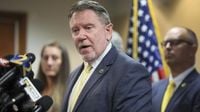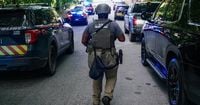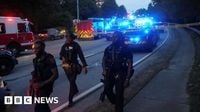On August 8, 2025, a barrage of gunfire shattered the quiet at the Centers for Disease Control and Prevention (CDC) headquarters in Atlanta, Georgia. The attacker, identified as 30-year-old Patrick Joseph White, unleashed more than 180 shots with a long gun, breaking approximately 150 windows—many of them blast-resistant—and sending glass shards flying into rooms across at least four CDC buildings. The sheer force of the assault was underscored by the recovery of more than 500 shell casings at the scene, as reported by the Georgia Bureau of Investigation (GBI) and The Associated Press.
White’s rampage left DeKalb County Police Officer David Rose dead, but, remarkably, no CDC employees were physically harmed. The chaos could have been far worse. According to Jeff Williams, who oversees safety at the CDC, security guards prevented White from driving onto the campus, forcing him instead to open fire from a sidewalk near a pharmacy across the street. "The protections we have in place did an excellent job," Williams told employees, noting that nearly 100 children at the CDC childcare center were safely reunited with their parents by night’s end.
Authorities say White’s motives were clear. Documents and electronic devices seized at his Kennesaw home expressed his profound discontent with COVID-19 vaccinations and a desire to make the public aware of his opposition. GBI Director Chris Hosey explained, "White had written about wanting to make the public aware of his discontent with the vaccine." White had recently verbalized suicidal thoughts, which had already brought him to the attention of law enforcement several weeks before the attack. He died at the scene from a self-inflicted gunshot wound, according to the GBI, after fatally shooting Officer Rose.
Investigators determined that White broke into his father’s locked gun safe to obtain the weapons used in the attack. Five firearms were recovered, including a gun belonging to his father. Despite the scale of the assault, authorities have not yet confirmed how many shots were fired by White versus law enforcement, as forensic testing was still pending days after the event.
The aftermath of the attack has left the CDC campus reeling. At least four buildings, including Building 21—which houses CDC Director Susan Monarez’s office—sustained significant damage. Employees were advised to work from home for the week as crews began the arduous process of replacing windows and cleaning up debris. CDC security pointed out the damage to U.S. Health Secretary Robert F. Kennedy Jr. during his tour of the campus on August 11, 2025. Kennedy was accompanied by Director Monarez and HHS Deputy Secretary Jim O’Neill, according to a statement from the Department of Health and Human Services.
Kennedy also visited the DeKalb County Police Department and met privately with Officer Rose’s widow. In a statement issued the day after the attack, Kennedy said, "No one should face violence while working to protect the health of others," and pledged that federal health officials were "actively supporting CDC staff." He did not address the impact of anti-vaccine rhetoric or the broader culture of skepticism surrounding vaccines during his visit, nor did he speak to the media.
The attack has reignited fierce debate over the role of misinformation and public discourse in fueling violence against health officials. Retired CDC official Stephan Monroe voiced his concern to the AP, saying, "I’m concerned that this is going to be a generational hit," referring to the potential long-term impact on young scientists’ willingness to work for the government. Tim Young, a CDC employee who retired in April, was more pointed: "Years of false rhetoric about vaccines was bound to take a toll on people’s mental health, and leads to violence."
Dr. Jerome Adams, former U.S. Surgeon General, echoed these concerns during an appearance on CBS’s "Face the Nation." "We have to understand people are listening," Adams said. "When you make claims that have been proven false time and time again about safety and efficacy of vaccines, that can cause unintended consequences."
Unionized CDC employees have called for more robust protections and a clear stance against vaccine disinformation. The AFGE Local 2883 union, representing CDC workers, stated, "This tragedy was not random and it compounds months of mistreatment, neglect, and vilification that CDC staff have endured." The union urged the administration to take "a clear and unequivocal stance in condemning vaccine disinformation," emphasizing that leadership is critical in restoring public trust and ensuring that accurate, science-based information prevails.
The political climate surrounding the CDC has grown increasingly fraught in recent years. Critics point to President Donald Trump and his allies for fostering an environment of vaccine skepticism and misinformation. According to a 2021 Cornell University study cited by The New York Times, nearly 38 percent of the COVID-19 misinformation conversation involved Trump, who was described as the "single largest driver of misinformation" about the pandemic. During the crisis, Trump promoted unproven treatments and downplayed the risks of the virus, contributing to widespread confusion and distrust.
The situation has not improved in Trump’s current term, critics say, and has arguably worsened with the appointment of Robert F. Kennedy Jr.—a prominent vaccine skeptic—as Secretary of Health and Human Services. Kennedy has made numerous misleading statements about the safety and effectiveness of COVID-19 and other vaccines. Recently, he canceled hundreds of millions of dollars in funding for mRNA vaccine research, a move that experts warn will hinder the development of emerging technologies that could combat future pathogens. Kennedy has claimed that mRNA vaccines "fail to protect effectively against upper respiratory infections like COVID and flu," a statement not supported by scientific research.
These developments have left many CDC employees and public health advocates feeling besieged. Fired But Fighting, a group of laid-off CDC workers, directly blamed Kennedy for fostering a "climate of hostility and mistrust," writing, "We need an administration that does not villainize federal workers who are just trying to do their job. We need a Health and Human Services Secretary who does not promote misinformation about science and vaccines." The group called for Kennedy’s resignation, as well as the departure of other administration officials accused of undermining public health efforts.
As the CDC begins the long process of repairing its battered campus and rebuilding staff morale, Director Susan Monarez urged her team to focus on trust and compassion. In her first "all-hands" meeting since the attack, Monarez told employees, "We need to rebuild the trust together. The trust is what binds us. In moments like this, we must meet the challenges with rational, evidence-based discourse spoken with compassion and understanding. That is how we will lead."
The scars of the attack—both physical and psychological—will not heal quickly. But for the CDC and its staff, the commitment to science, public health, and one another remains as vital as ever.



